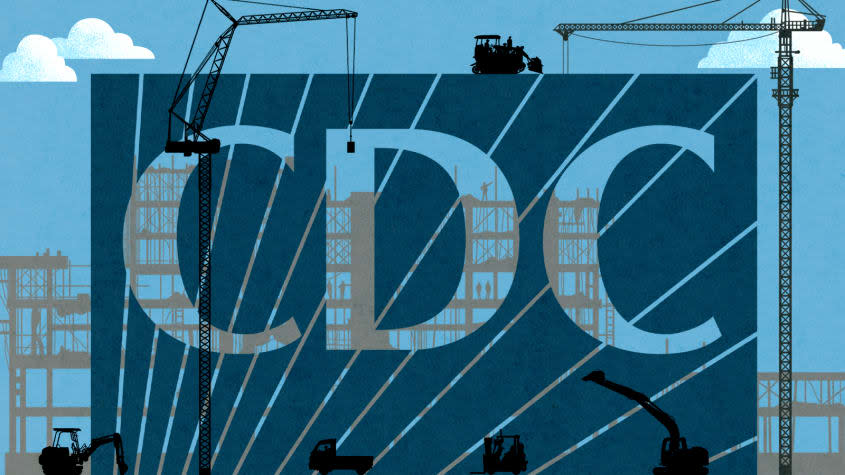Can the CDC be fixed?

- Oops!Something went wrong.Please try again later.
The U.S. Centers for Disease Control and Prevention is done being the nation's punching bag.
After a brutal and chaotic two years marred by its response to the coronavirus pandemic, the CDC will soon undergo a sweeping and dramatic revamp, Director Rochelle Walensky announced last week. "For 75 years, CDC and public health have been preparing for COVID-19, and in our big moment, our performance did not reliably meet expectations," Walensky said in a statement. Moving forward, she added, agency culture will emphasize "accountability, collaboration, communication, and timeliness." At this point, however, with its "pretty dramatic, pretty public mistakes" out on the table, can the CDC even be saved? If so … how? And is the admission of incompetence enough to set into motion the overhaul the agency needs? The media weighs in below:
The CDC must go back to its roots
Walensky's apology is a "classic act of contrition theater," Carl Schramm, Syracuse University Professor and member of the COVID Commission Planning Group, wrote for The Hill. "Acknowledging failure" is not enough, and it's not like the issues seen with COVID-19 were "new problems" — just look at how the CDC responded to the HIV-AIDS epidemic.
The agency's real issue is that it "long ago forgot its principal job is preventing epidemics of communicable disease;" instead, its focus is now on things like diabetes, heart disease, and drug abuse — all horrible social problems, yes, but ones "for which the tools of managing real epidemics won't work." In order to regain public trust and rehab the agency's image, "Walensky should ask Congress to cut the CDC down to size, restoring its focus on preventing communicable diseases," Schramm argued. But "without such a drastic move, no apology, however sincere, will save the agency."
Yes, and …
Walensky is correct in recognizing that the CDC must become "more action-oriented, clear in messaging and better grounded in data and laboratory science," mused The Washington Post Editorial Board. But there are also "larger, urgent questions about the nation's public health system" that the CDC cannot ignore if it hopes to "fight the next pandemic more successfully than it has fought COVID."
For one thing, it must find a way to "deliver crystal-clear, action-oriented communications to the American people; sharing vital data "should not be rocket science," the board argued. And furthermore, it should ensure that experts in "retooled public health agencies" — like the CDC — are the ones fighting health crises, not "politicians in the White House." The nation needs genomic surveillance, it needs proactive pandemic funding, and it needs to "finally quit the cycle of public health panic and neglect," the board proclaimed. All in all, it "needs the CDC to be its very best."
The Bloomberg Opinion Editorial Board argued similarly to the Post back in May, before Walensky announced a reset, but after she shared news of an external review of the agency. Following a slew of recommendations for potential areas of improvement — such as expedited data collection and reporting, streamlined public communication, and an extensive review of laboratory operations — the Bloomberg board arrived at what seemed to be the central point of its piece: To make good on its job and save its reputation, the CDC must first "rebuild the trust that it had long taken for granted."
Fix the rest of the system, too
The policies and procedures of the CDC certainly deserve a closer look. But even so, the agency represents "just one element in America's public health system — to truly understand the shortcomings of the nation's COVID response, an analysis "must also include other key players at the federal, state, and local level—both public and private," former senior CDC official Ronald O. Valdiserri opined for Health Affairs. Fixing the CDC without a "concomitant investment in state, local, and tribal departments of health, and their attendant workforces, will fail to deliver an improved response to the nation's next pandemic or other desired outcomes in population health."
If a stronger and better pandemic response is what we're after, "the solution is bulking-up the nation's public health system — not whittling away the mission of the CDC," Valdiserri said.
This is an 'inflection point'
An overhaul is exactly what the CDC needs, and the agency gets some credit for admitting that, former White House COVID response coordinator Dr. Deborah Birz recently told CBS. "A lot of directors would have just tried to tweak, and tweaking the agency at this point was not going to be successful," Birx told Face the Nation on Sunday. "This is an inflection point. I think [Walensky] recognizes that, and I think … we all should be proud as Americans, that the director was willing to do this hard work to find the issues, and now they have to be fixed."
Reform is possible, Birx later continued, but those within the CDC must change "how they collect data, how they present data, and how they communicate to the American people."
You may also like
Jimmy Fallon accused of enabling sexual assault of a teenager
Mar-a-Lago has underground tunnels, new book on Giuliani's 'tragic fall' discloses
Trump envoy releases letter from National Archives deemed 'extraordinarily damning' for Trump

